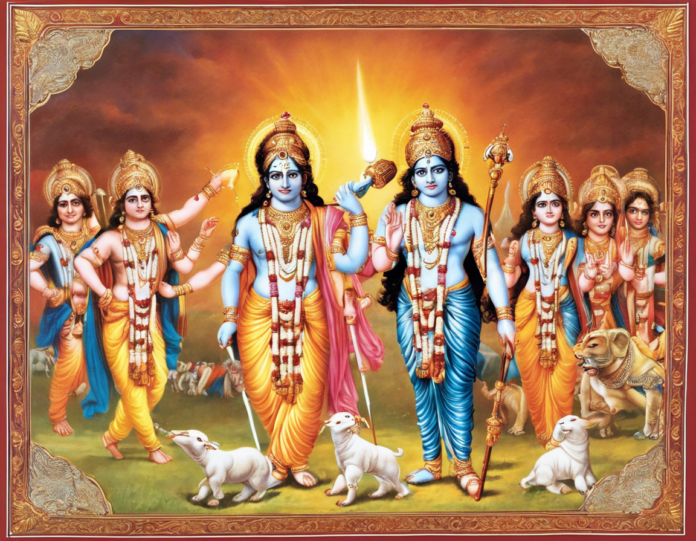The Bhagavad Gita, often referred to as the Gita, is a sacred Hindu scripture that is part of the Indian epic Mahabharata. It consists of a conversation between Prince Arjuna and the god Krishna, who serves as his charioteer. The text addresses the moral and philosophical dilemmas faced by Arjuna on the battlefield, offering guidance on duty, righteousness, and the path to self-realization.
For those interested in delving deeper into this ancient scripture, access to a free download of the Bhagavad Gita PDF in English can be a valuable resource. By having the text in a digital format, readers can easily navigate through the verses, make annotations, or simply have a portable version for study and reflection. In this article, we will explore where you can find a reliable source to download the Bhagavad Gita in English, discuss the significance of this revered text, and provide insights into its teachings.
Where to Find a Free Download of the Bhagavad Gita PDF in English:
-
Sacred-Texts.com: This website offers a wide range of religious texts, including the Bhagavad Gita in English translation. The site provides the complete text in PDF format for free download.
-
Bhagavad-Gita.org: This site specifically focuses on the Bhagavad Gita and offers free downloadable PDFs of the scripture in various languages, including English. You can easily access the PDF version for offline reading and study.
-
GitaPress.org: Gita Press, Gorakhpur, is a renowned publisher of Hindu religious texts, including the Bhagavad Gita. Their website provides a free PDF download of the Gita with English translation and commentary.
-
Archive.org: The Internet Archive is a vast digital library that offers access to countless resources, including the Bhagavad Gita. You can search for the Gita in English and download it in PDF format for free.
Significance of the Bhagavad Gita:
The Bhagavad Gita holds immense spiritual and philosophical significance for Hindus and spiritual seekers worldwide. It is considered a timeless guide that imparts profound wisdom and teachings on various aspects of life. Some of the key themes and teachings of the Gita include:
-
Duty and Dharma: The Bhagavad Gita emphasizes the importance of performing one’s duty (svadharma) without attachment to the results. It teaches individuals to act selflessly and in alignment with their inherent duties.
-
Yoga and Self-Realization: The Gita introduces different paths of yoga, including Karma Yoga (path of selfless action), Bhakti Yoga (path of devotion), and Jnana Yoga (path of knowledge). It elucidates the ultimate goal of self-realization and union with the divine.
-
Detachment and Renunciation: Through the dialogue between Arjuna and Krishna, the Gita delves into the concept of detachment and renunciation of desires. It advocates for equanimity in facing life’s challenges and triumphs.
-
Transcendence of Suffering: The Gita offers insights into transcending suffering and attaining inner peace through spiritual wisdom. It guides individuals on how to navigate the ups and downs of life with resilience and grace.
Key Teachings of the Bhagavad Gita:
-
Oneness of the Self: The Gita teaches that the true Self (Atman) is eternal and beyond the transient physical body. It elucidates the concept of the immortal soul that is interconnected with the universal consciousness.
-
Importance of Meditation: Meditation is highlighted as a powerful tool for self-realization and inner peace. The Gita encourages individuals to cultivate a disciplined mind through meditation practices.
-
Equality and Non-Discrimination: The Gita promotes the idea of equality among all beings and advocates for non-discrimination based on caste, creed, or social status. It emphasizes seeing the divine essence in all living beings.
-
Devotion and Surrender: Bhakti Yoga, the path of devotion, is extolled in the Gita as a means to cultivate love and devotion towards the Divine. Surrendering one’s actions and outcomes to the Supreme is emphasized as a liberating practice.
-
Universal Ethics: The Bhagavad Gita provides a moral and ethical framework for righteous living. It underscores principles such as honesty, integrity, compassion, and selflessness in all actions.
Frequently Asked Questions (FAQs) about the Bhagavad Gita:
- What is the Bhagavad Gita?
-
The Bhagavad Gita is a Hindu scripture that comprises a dialogue between Prince Arjuna and Lord Krishna on the battlefield of Kurukshetra.
-
What is the main message of the Bhagavad Gita?
-
The primary message of the Gita revolves around fulfilling one’s duty, attaining self-realization, and surrendering to the divine will.
-
How many chapters are there in the Bhagavad Gita?
-
The Bhagavad Gita consists of 18 chapters, each addressing different aspects of life, duty, and spirituality.
-
Is it necessary to have a background in Hinduism to understand the Bhagavad Gita?
-
While a background in Hinduism can provide cultural context, the teachings of the Gita are universal and can be understood and appreciated by people of all backgrounds.
-
What are some popular commentaries on the Bhagavad Gita?
- Some renowned commentaries on the Gita include those by Adi Shankaracharya, Swami Vivekananda, Swami Sivananda, and A.C. Bhaktivedanta Swami Prabhupada.
In conclusion, the Bhagavad Gita stands as a timeless spiritual classic that offers profound wisdom and insights into leading a purposeful and fulfilling life. By delving into its teachings through a free download of the Bhagavad Gita PDF in English, readers can embark on a journey of self-discovery, inner transformation, and spiritual evolution. Embracing the timeless truths of the Gita can illuminate one’s path and foster a deeper understanding of the self and the cosmos.

